City centre development: making it happen
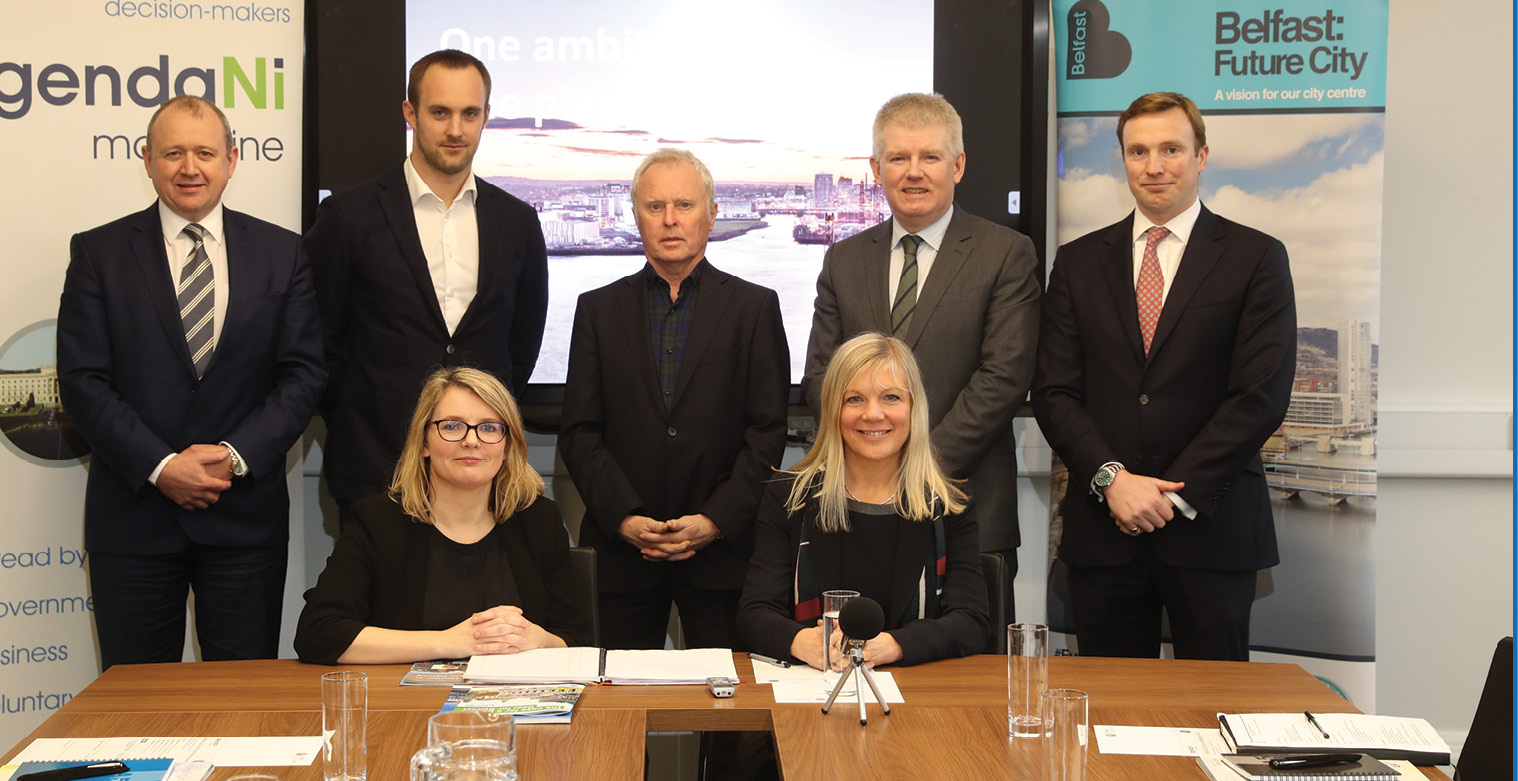
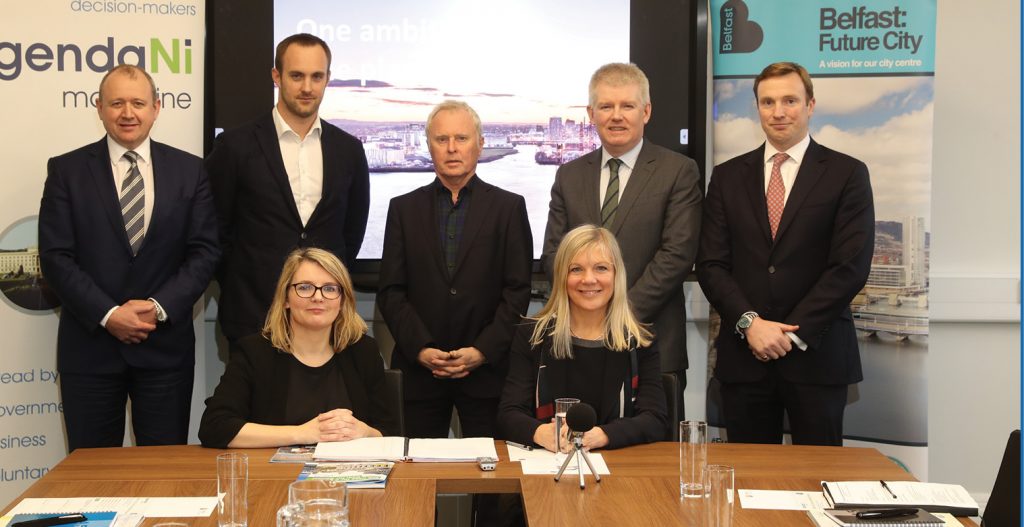
Belfast City Council hosted a round table discussion on the future of Belfast and how the city centre should be developed in terms of physical regeneration, transport links, city centre living, office accommodation, retail offering and tourism.
How important is physical regeneration in developing the city? What role does transport and connectivity play in making the city work?
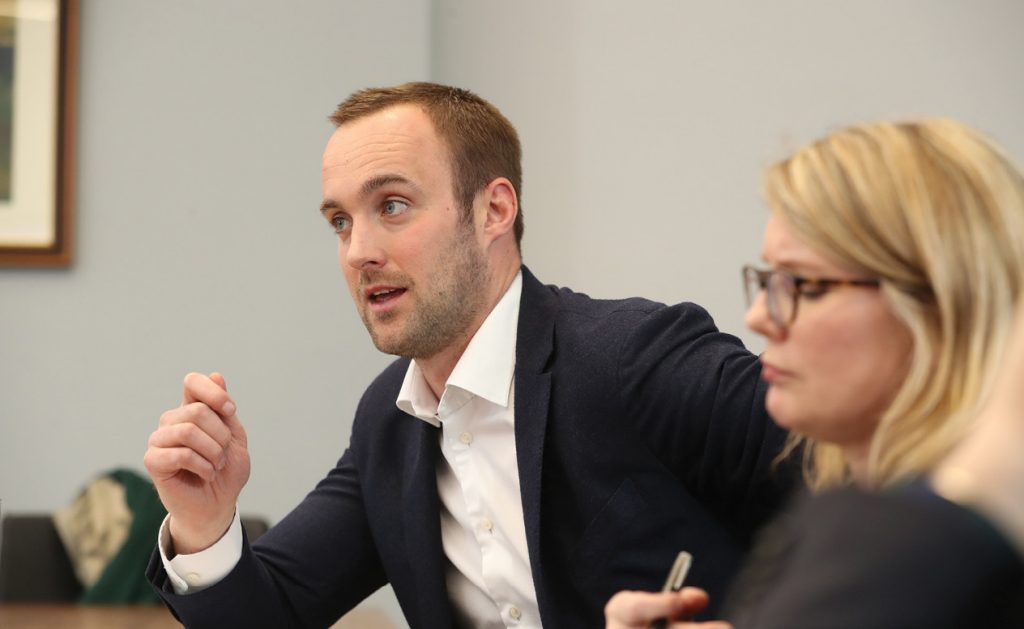
Patrick O’Gorman
Physical regeneration is hugely important. In order to become a leading city a huge amount of work needs to be done and a lot of physical regeneration is still needed. When you look around other cities that you visit for work or pleasure there are spaces that are amazing. There are some areas like that in Belfast but we need many more of them. That requires a lot of private development and public finance to come together. I was first here in 2003 and since then there has been a huge amount of progress. An important aspect is to have a catalyst for each area. For example, the Cathedral Quarter is a great catalyst for that part of the city and we need several other catalysts like that around the city.
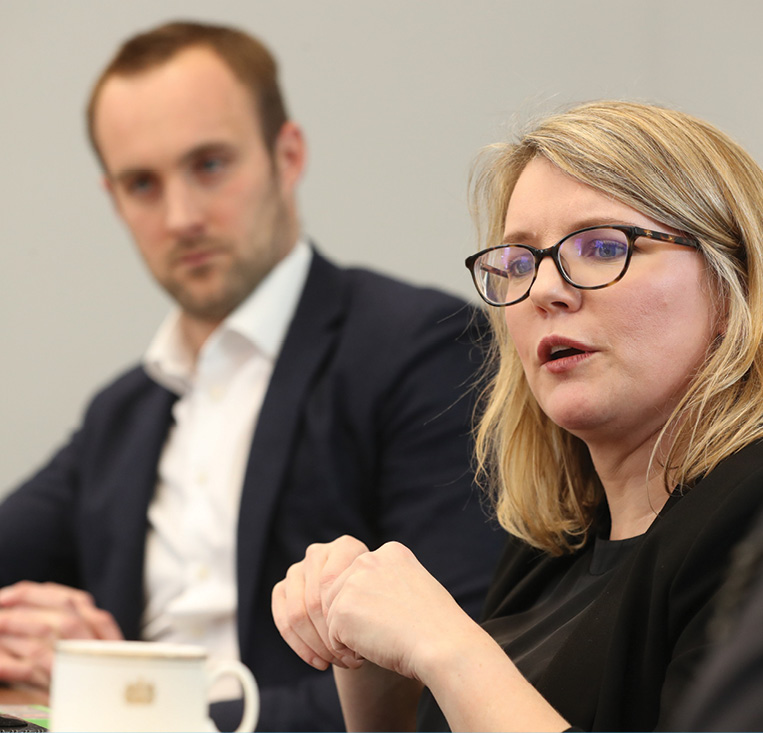
Nuala Gallagher
It is critical in terms of how you physically intervene in the city. The Belfast City Centre Regeneration and Investment Strategy identifies five key areas where intervention needs to happen. It is also about the quality of the intervention – how it improves the streets, what is happening in terms of the public realm. It should not be development at any cost. Any development needs to focus on sustainable long-term uses and have enough flexibility to provide a long-term solution.
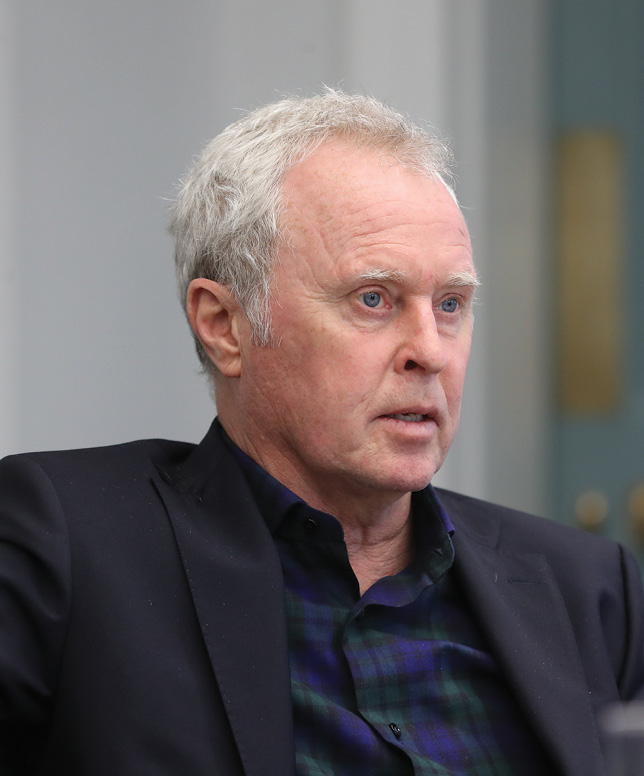
Bill Wolsey
Physical regeneration of a city is important as long as respect is paid to the magnificent buildings that we have and they should be restored to what they were once. Belfast has moved on greatly but some of the public areas need attention. Transport and connectivity are also hugely important. We just saw this week a car break down on the Westlink and a lorry overturn and the whole city ground to a halt. There needs to be someone with an overview of how a modern expanding city can have a sensible transport system. We also need airports that connect with most major destinations and we need some sort of government intervention to ensure our airports are competitive with Dublin airport.

Anthony Best
Belfast is an attractive city with a lot of very nice buildings. Physical regeneration is very important as long as it is not done in a piecemeal fashion. It should look at the wider impacts of the development and any new development should be integrated into the city. Belfast City Council does need new powers to help that integration process. We also need more partnerships to pull together both public and private organisations to develop the city overall.
Public transport is key into the future. The car has had its day and public transport – buses, trains and trams – are the way forward and we need a very clear objective as to how we are going to get that infrastructure working and we need much more public investment in public transport.
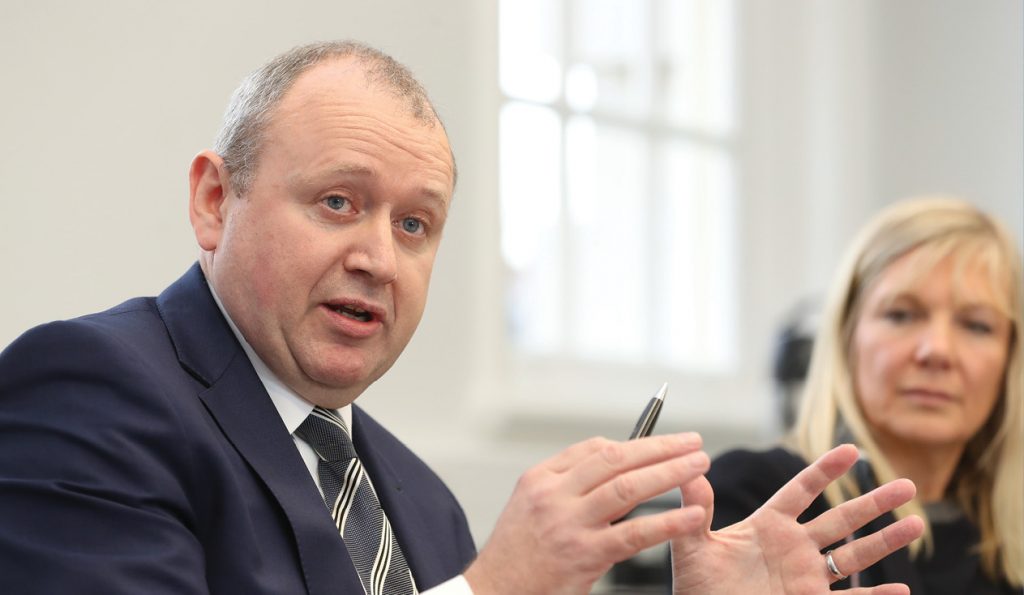
Stephen Surphlis
Regeneration is critical to a city’s economic activity, regeneration and development becomes self-perpetuating as it brings more people into the city either to live, work or visit and that in turn will put more money into the overall economy. For that to happen a lot of things have got to come together. Like many other regional cities Belfast is repositioning itself from an industrial past to a more service-based economy. The city centre provides opportunities for regeneration and brownfield development should be encouraged and infrastructure and transport needs should be easier to accommodate in the city centre.
Transport is also critical. The combined transport hub is to be encouraged. To have a central transport station linked to the Enterprise from Dublin will bring a benefit to the whole city. We need to understand how we are going to position ourselves in relation to Dublin airport. At present we have two airports but perhaps a better thought through strategy would allow us to compete as another hub for the island.
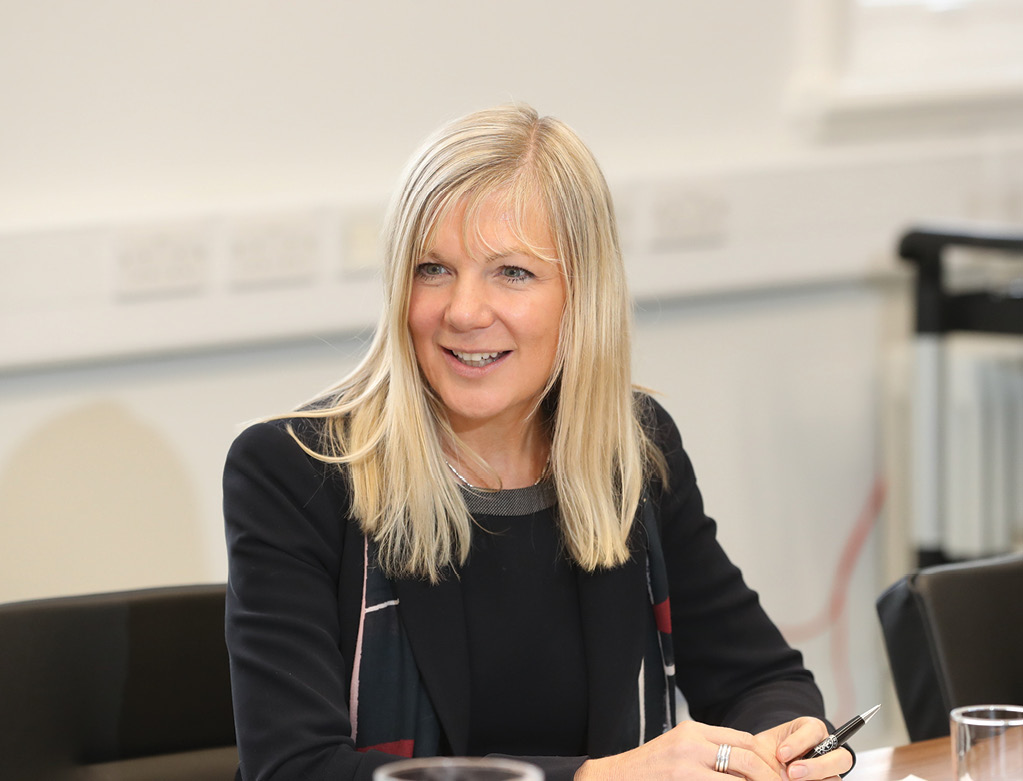
Suzanne Wylie
Belfast needs to be a competitive city. It needs to compete with other places outside Northern Ireland – on the island of Ireland, in the UK, across Europe and across the globe. Regeneration plays a fundamental part in that. It is important to ensure that we can get more jobs into the city and to create the right spaces, buildings and infrastructure to boost economic growth, whether that is more office accommodation, hotels and residential development. We also have to have the right retail offer for a modern city that pulls in people from across Northern Ireland and the South. In terms of space and physical infrastructure, it has to be a city where people want to live. In the past we have been guilty of cutting off the communities that live around the edges of the city and we need to look at how regeneration can stitch in those communities again and connectivity is a key part of that.
We should also recognise what has been done. When we sat here two years ago we didn’t have 10 hotels in planning, the new futuristic Bullitt hotel wasn’t built, phase I of the Ulster University campus is now complete with phase II underway. We have our new convention centre in the Waterfront Hall, a third film studio and student accommodation is going up around the city.
Transport is fundamental to the development of the city – particularly as we are to grow the number of jobs in Belfast by 50,000 over the next 20 years. Car parking in the city is important to get right. We need the York Street interchange. We already have 58 per cent of our working population travelling in and out for work each day. We have to get the public transport and the road network right. We have big plans for the city and joining up the city is a key facet of that. For example, we would like to get the 700,000 people visiting Titanic Belfast each year into the city centre to another big attraction and to spend money there also.
How can city centre living be encouraged? Will student accommodation encourage this?
Patrick O’Gorman
With a target of an additional 50,000 people working in the city, if 10,000 to 15,000 of them live in the city centre that will help public transport and everything. Donegall Place is the prime location and it is not that busy, certainly compared to somewhere like Church Street in Liverpool. We need more people living in the city centre and that will help with retail, the evening trade and other businesses and the general atmosphere of the city. At 5.30pm from Monday to Thursday Belfast is very quiet. To encourage city centre living we have got to build and get the right buildings. The new residential buildings in the city are fully let and have a mixture of demographics. For young families, like those living in apartments in Europe, you need recreational space in the city and not big parks but the smaller parks you see in Spain surrounded by restaurants and cafes.
Anthony Best
There is a huge demand for city centre living. We have been involved in some of the student accommodation and we are now 100 per cent full at College Square East. When we started out everyone said we were mad. Student accommodation in Belfast is achieving higher rent levels than somewhere like Sheffield. There is now a generational change where people want to live in the city but there is nowhere for them to live. The students are only the start of this trend. Once they come and live in the city centre they will then turn into graduates and then young professionals, who will want to live and work in the city centre.
Stephen Surphlis
Historically, there has been an issue with city centre living. Certainly, compared to other cities in Europe where city centre living is the norm. That is less so in the UK and Ireland. People gravitated towards the suburbs for the ideal of the house and garden but that is now changing. For many people now working in Belfast City Centre, particularly graduates and people new to the city, their preference is to live within walking distance of their work whilst also being convenient to social and recreational amenities.
There are challenges in funding, particularly with apartments for private sale. Banks and funders still need convincing that there is a market for new city centre accommodation and new funding models have a role in addressing these changes particularly PRS and that is supported by government policy. From a planning perspective, the bigger buildings required by many PRS investors are usually favoured in city centre locations.
Bill Wolsey
Of all of the five questions here, city centre living will most change the face of the city. Those few developments that have been done have an age spread and I believe that there is pent up demand. From a construction point of view, size and scale matters, but there are some smaller developers that would be willing to take on the smaller buildings. Planning needs to be looked at to make that happen. I can’t think of anything that would have such a dramatic effect on the city centre. People living in a city that they care about, everything from how clean their streets are or who comes marching through their city.
Suzanne Wylie
The opportunity is just coming to the fore now. We have now gone well beyond the historic effects. There is now a niche market for city centre living. Those students are in good accommodation and they are going to get new, better paid, jobs and somewhere better to live. It will also help us retain the talent we have here. We have just been talking to an investor this morning who was looking at the opportunity for young graduate appointments creating more city centre living is an area where the council might have a role in making things happen.
Anthony Best
We are building schemes at the moment where we have students, key workers and PRS all together – that covers the age ranges 18 to 34 and the level of quality is very high.
Patrick O’Gorman
The rates policy is important to encourage city centre accommodation. When you are working your numbers up, rates take up a big chunk of the costs and in order to get things off the ground the numbers are tight and if you reduce the rates it will certainly help to get things started.
Nuala Gallagher
When I moved to Belfast it was challenging to find something in the city centre and there is certainly a gap in the market. The university with its students will bring a vibrancy to the city but we have to create communities. We also need to have the infrastructure, including transport, to support these communities.
Is there enough office accommodation in the city?
Stephen Surphlis
Since the financial crisis and downturn there has been very little new office accommodation developed. Market conditions are improving and there is now some pent up demand. There are a number of schemes in the pipeline. Funding has a key part to play in bringing new schemes to the market. Many of the traditional sources of funding only have an appetite where there is a pre-let in place or if there is certainty of securing a tenant. It will only be when the market becomes much freer that funders will support more speculative developments.
Patrick O’Gorman
There is not enough office supply for existing occupiers and there needs to be more development. The next level of Belfast’s progression will need more occupiers, more international occupiers. At the moment Belfast has local law and accountancy firms that have been here for decades who are struggling to find office space but Belfast needs new employers from across the world. But we must create something special because for these new tech companies their office is everything. Maybe we have the advantage of not having big boring office spaces to let and are starting from scratch – we could create something special.
Nuala Gallagher
A lot of the tech companies start small and then expand. How we respond with a flexible office offering will be increasingly important.
Suzanne Wylie
You can’t look at just the big grade ‘A’ office buildings alone. You need to look at the whole economic ecosystem below. Incubation space for small start-ups is just as important. That often takes government support. We have just built an Innovation Factory with 55,000 sqft on the old Mackie’s site on the Springfield Road and we are looking to do more of that in the city centre. For the bigger offices we are much better value for occupiers than other cities such as London or Dublin. We also have the NICS consolidating three offices in the city centre. The public sector will play its part but we have to get this issue resolved as our economic growth model is based on growing small businesses and on a strong foreign investment pipeline.
Anthony Best
It is a confidence issue to deliver speculative office space. As with any regeneration it can’t be done piecemeal. It needs to come together to meet the needs of FDI companies.
Bill Wolsey
In the Cathedral Quarter we have so many government offices with dreadful looking ground floors. I would like to see retail units on the ground floors which would improve things.
Nuala Gallagher
Our investment fund is to address the risk issue around speculative development in the city. It will help share the risk with the private sector and not compete with it. I agree with Bill on improving the ground floor of office buildings and the location of them is also important. In the right place it can help the retailers in the surrounding area.
How can the city’s retail offering be developed?
Suzanne Wylie
We are a top 10 UK city in terms of population etc. but in retail terms we are 16th in the rankings. We had dropped to 18th during the recession but things are improving. The number of vacant units has dropped and new entrants are coming into the city such as Patisserie Valerie, Greggs and Moss Bros. We recently had a retail analysis of the city carried out and it showed we need more ‘aspirational’ retail, more quality retail in the city centre.
Bill Wolsey
The answer to retail fits into the next question on tourism. While Victoria Square is an upmarket form of retail there is nothing really on the retail front in Belfast that would make tourists want to come back. The whole of the retail sector is suffering dreadfully because of internet shopping. I was in Madrid and the city authorities had taken over a row of small shops and in the 10 shops or so there was a baker, a jeweller and a hat maker. That sticks in my mind and is a reason I would go back. In this city we have many craftspeople like that but they don’t have ground floor operations. This is an area where the public and private sectors should co-operate. That approach would add a degree if authenticity to the city’s retail offering. It would give us the edge other cities don’t have. It would be a hook for both shoppers and tourists.
Nuala Gallagher
Authenticity is key. People come into the city for the experience. You can sit at home and buy anything.
How can tourism be developed?
Bill Wolsey
Our licensing laws are nonsensical and need to be looked at. Our Sunday opening hours also need looking at if we are to attract more weekend spending. We have so many disappointed people come to Belfast for a weekend which really means arriving Friday evening, checking in and having a meal. You have Saturday for shopping and you are leaving at 3-4pm but nothing opens until 1pm.
Having said that we have achieved a lot in tourism. Belfast punches well above its weight. We have a friendly and safe city with a number of real quality restaurants, bars and hotels.
Suzanne Wylie
The figures do show tourism is growing year on year. The hotel occupancy rates are high. We had 82 cruise ships this year and we now have a convention centre that is bringing in more business tourists who spend more. There is still a gap in the tourism market and we need another attraction of scale and one that is in the city centre – an investment of up to £100 million to tell the story of Belfast. The market for tourists here is for the culturally curious. They want to find out about this place and our past.
Bill Wolsey
Not all initiatives need money. I had an idea for the Ulster Museum. They are an iceberg operation with only a little of their stuff on show. We are a city with a shared identity and I asked them to take some of their things out of the museum and put them in the corner of shop windows and have a little story about it. It could be Wolf tone’s glasses in the window of Zara. That would appeal to the disadvantaged areas of the city that do not go near museums. It would also break down barriers and would be good for tourists. Our whole tourist drive should be about authenticity.
If you had to choose one thing that would most aid the future development of Belfast city what would it be?
Suzanne Wylie
A joined up focus that would put Belfast as the driver of the regional economy. That would include a ‘city deal’ for Belfast city region – that has an ask for ourselves as the local authority, the Executive and Westminster to get behind regeneration, infrastructure, the skills development of the people in the city and which looks at alternative forms of financing to make it all happen.
Stephen Surphlis
We need a holistic approach. We need to get [office] occupiers into the city. We have many great indigenous companies and some large corporations but we need many more of those. We need a convincing argument as to why they should come here – along with the focus on the technology sector our corporation tax rate has got to be competitive by comparison to mainland UK and the Republic. Certainty around implementation of the reduced 12.5 per cent rate in 2018 is crucial to attracting new occupiers to Belfast.
Anthony Best
City centre living. The leisure industry, office accommodation, retail and the university will not happen unless we offer places to live. That will all be driven by people living in the city centre. At present the city is a 9 to 5 Monday to Thursday daytime and Thursday to Saturday night time city and we need to move to a 24/7 city.
Bill Wolsey
I agree that city centre living is the one thing. Any obstacles in the way of developers opening up the city should be looked at and dealt with as quickly as possible.
Nuala Gallagher
I think it is a combination of all of those things, particularly infrastructure in its widest sense and that includes transportation as an enabler to housing infrastructure. The mark of success will be when you see more children and families living in the city.
Patrick O’Gorman
There are lots of people who love Belfast, whether they live here or come to work here. What is needed right now is the right leadership for the city to promote the development of the city and have central decision-making to help develop the city.
Participants
Patrick O’Gorman, Principal, Bywater Properties
Patrick has been a Principal of Bywater Properties since 2013. He previously spent 10 years at CBRE working on over £1 billion of commercial real estate transactions across Europe. Bywater is working on over 1 million sq ft of development across the UK, and has over £130 million of assets under management. Patrick is a qualified Chartered Surveyor and is an honours graduate from King’s College London.
Anthony Best, Managing Director, Lacuna Developments
Anthony has been Managing Director of Lacuna since 2015 and is a chartered surveyor. He spent nearly a decade in London working in the property market before moving back to Northern Ireland. His current focus is on moving the business forward in the development sector. The company currently has around £100 million end value of development schemes either under construction or in planning.
Stephen Surphlis, Group Property Director, McAleer & Rushe
Stephen Surphlis is responsible for securing and delivering McAleer & Rushe’s development programme. This includes sites in Belfast currently in construction: 100,000 sqft offices for Belfast City Council on Adelaide Street, almost 1,200 bedrooms of student accommodation for Queen’s University on College Avenue and McClintock Street, and a 237 bedroom Maldron hotel for Dalata Hotel Group Plc on Brunswick Street. In addition, proposed schemes include Norwich Union House on Fountain Street/Castle Street, mixed use development on Corporation Street, offices on Great Victoria Street and the former Belfast Telegraph premises in conjunction with Belfast City Council.
Bill Wolsey, Manging Director, The Beannchor Group
The Beannchor Group is one of Northern Ireland’s largest employers in the hospitality industry, with venues including The Merchant Hotel, over 40 pubs, the Little Wing Pizzeria chain of restaurants and the recently opened Bullitt Hotel, employing over 750 people. Managing Director, Bill Wolsey is a positive ambassador for Belfast and Northern Ireland and has made a terrific contribution to the hospitality and tourism landscape of Belfast city through his visionary approach to developing new and exciting venues that have vastly improved the social fabric of the city.
Nuala Gallagher, Director of City Centre Development, Belfast City Council
Nuala took up the role as Director of City Centre Development with Belfast City Council in June 2016. She is a registered architect and urban designer and has been working in urban development internationally for 18 years. She previously worked at the London Borough of Newham heading up the Regeneration team on projects across the borough. Nuala also worked in New York City, leading on sustainable community development in a low income area of Brooklyn as well as teaching at Columbia University’s Graduate School of Architecture, Planning and Preservation.
Suzanne Wylie, Chief Executive, Belfast City Council
Suzanne Wylie took up the post of Chief Executive of Belfast City Council from 1 July 2014. She has been leading the Council’s new City Plan, the Belfast Agenda 2030, which is focused on economic growth and connecting neighbourhoods and people to the opportunities it creates. The Council also launched its new City Centre Regeneration and Investment Strategy in September 2015 aimed at ensuring the city can compete on a global level. Suzanne has worked for Belfast City Council for 28 years and is married with three children.











